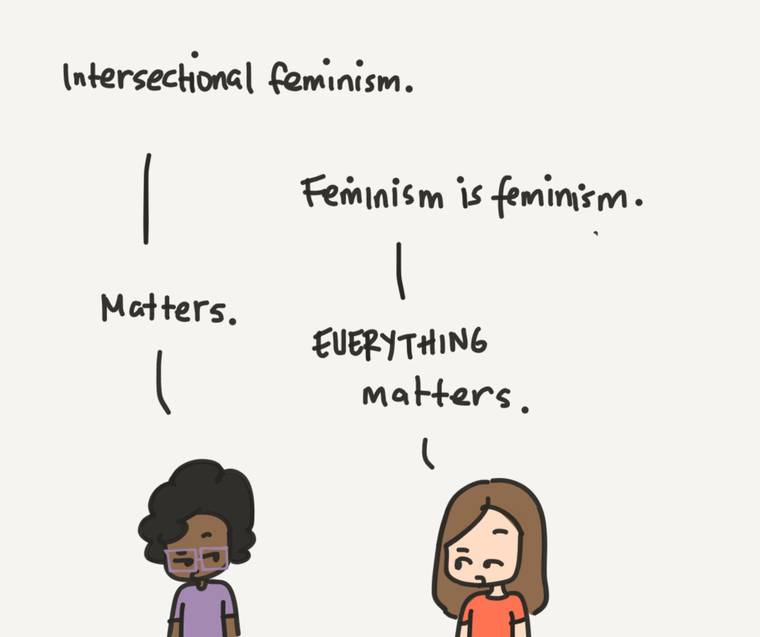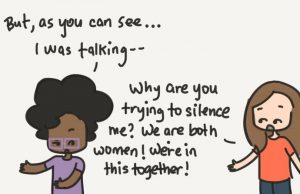The Time Has Come for White Women to Move Beyond Lip Service: Toward an Anti-Racist Professional Ethics for White Women’s Studies Directors
We, The Damned Collective, are delighted to host the work of The Damned. Below you will read Dr. Merri Lisa Johnson call to White Women (and others). She asks “What are you doing—with, through, and against your whiteness—to decenter whiteness in Women’s Studies?” and offers a ten-point checklist to get this work started. #doitfortheDAMNED #doitfortheDAMMM
By Merri Lisa Johnson
“Feminism is the political theory and practice that struggles to free all women:
women of color, working-class women, poor women, disabled women, lesbians,
old women—as well as white, economically privileged, heterosexual women.
Anything less than this vision of total freedom is not feminism, but merely
female self-aggrandizement.”
– Barbara Smith, “Racism and Women’s Studies” (1980)
White women use the words, the creative brilliance, the intellectual labor, the #blackgirlmagic of feminist Blackacademics every day. We—us white women—use the words and the labor as a core value of our Women’s Studies programs, as university and classroom spaces dedicated to (the word, if not the lived reality of) intersectionality. Jennifer Nash told that. (That’s how my two-year-old Black daughter would put it because she already has an excellent Black feminist politics of citation, and no I’m not mentioning her to give myself some kind of Black-ally street cred badge but rather because her phrasing is brilliant and to use it, I absolutely must cite it.) If we are lucky enough to have more than a one-person, white-person program, maybe we also use the emotional labor of our colleague’s smiling Black faces in our publicity materials and committee meetings. Pictures of diversity are non-performatives, meaning things we do so we don’t have to do real diversity work. Sara Ahmed told that. What are we going to give in return for all their brilliance? Or are we just going to take it, no thank you, no receipts? Worse, are we going to take it, use it, mark it as outdated, and then dispose of it through the anxious speech acts of anti-identitarian post-intersectionality? Tiffany King told that.
It is so easy to be a colonizer. It’s automatic for white people. It’s the factory setting. You have to undo it manually. So if white women want out of that role, there is real work to be done. The time has come to do the work or admit that improving (straight cis) white women’s lives was good enough all along. What are you doing—with, through, and against your whiteness—to decenter whiteness in Women’s Studies? Here’s a ten-point checklist to get this work started. (And no I’m not saying I’m the first or the only white woman doing these things or calling for this work, and if I sound defensive with my back arched up in italic font it’s because I know too much about how calls for social justice get undermined by the very people standing next to us sharing our values, and I want to present this in a way that does something other than participate in a cycle of the Left eating its own.)
- Believe Black Women: If your Black colleague says she is on the receiving end of some racist business in her department or university, believe her and back her up. Anti-racist work cannot all be carried on the backs of Black women. Write letters. Set meetings. Advocate. Clear a path for her joy and wellness. Don’t be mad if she tells you to:
- Be Humble, Sit Down: If your Black colleague says she is ready to make a move against racism in Women’s Studies or academia, don’t assume you know the right or best path forward. She’s grown. She likely knows what she wants to do about the problem. Do not provide unsolicited advice. Do not take the wheel or get in front of her. Add to her momentum when requested. Otherwise, do like Kendrick Lamar says and sit down.
- Make Whiteness Visible: Talk about your own whiteness and the ways it makes a path for you that is less obstructed than the paths made for Black women. Talk about the whiteness of decision-makers and the whiteness of the decisions they/you are making. This is not a self-hating or self-martyring activity. It is an act of demystification. Which is our job.
- Reverse the Usual Marginalizations in Curriculum: If you teach a class on a subject that is typically very white in content, and that scholars of color have critiqued for its whiteness, it is not necessary to replicate that pattern when you teach the subject (i.e., teaching the white version and ending with a unit on critiques from people of color). Examples from my own teaching are Girls Studies and LGBTQ Studies, both of which now center the experiences and scholarship of people of color. Because why be part of the problem? Change the story of the field with your syllabus.
- Reverse the Usual Marginalizations in Co-Curricular Programming: Bring people of color to campus to give talks, do poetry readings, lead workshops, headline symposia. Bring more people of color than white people to your campus. Put institutional and grant money in the bank accounts of scholars and artists of color. #Reparations. If your student body is racially diverse, the students of color deserve to see their skin tones at the front of the room. If your student body is very white, the white students need to hear from people of color on a regular basis to disrupt the static of white normativities always in their ears.

- Evaluate Black Women with Fairness, Love, and Gratitude: If student opinion polls negatively evaluate them for being too strict, understand the student is bringing a mammy stereotype to the classroom. Cheryl Johnson told that. If your Black colleague wants to move some courses online and reduce face-to-face contact with students for a while or manage her commute more efficiently, be flexible and make it happen. Not to put too fine a point on it, but Black professors are teaching while living under white supremacy. There are injuries happening to their bodies and spirits just from watching the news, just from walking driving shopping moving teaching while Black, just from showing up. There are not enough women of color in academia to begin with. Let’s not drive away, squeeze out, or wear down the ones who are here.
- Be an Equity Advocate/Say What They Can’t Say and Be Heard: If you’re on a search committee and women of color candidates are not being marked as viable options: raise questions, make arguments, and get them on the short list for visits to your campus. If women of color are under-represented in leadership positions on your campus, notice this and write it up. If women of color are underpaid or doing uncompensated labor on your campus, notice this and bring it to the attention of the decision-makers above you. Your whiteness will likely get you further in the door on these subjects of inequity.
- Recruitment and Retention of Black Women: Propose Black women and other women of color for leadership positions on campus and in regional or national organizations. And don’t break your arm patting yourself on the back for it. Moving in the opposite direction, if the woman you want to nominate is too busy uninterested protecting her time to write etc., then switch it up and be an ally in protecting her time. Contradict colleagues who say she is not doing enough in the department or organization. She is doing plenty. She is doing more than enough.
- Consider Stepping Down or Declining the Offer: When offered leadership positions, ask if any Black women have been considered for the job. Don’t participate in vortexes of whiteness. Are all your adjuncts and student workers white? Rethink that mess!
- Do What We Said We Were Going to Do: I honestly thought we were all already doing most of these things, but it has been brought to my attention that that’s not the case. So like I said at the beginning, it’s time for a profession-wide commitment to anti-racist leadership from white program administrators of Women’s Studies, not just pointing at institutions above and around us, but holding ourselves personally accountable as well.
 Dr. Lisa Johnson directs the Center for Women’s and Gender Studies at USC Upstate, where she has initiated numerous anti-racist feminist initiatives on campus and in the community over the past decade. Her research investigates the stigmatization of various minority cultures in mainstream culture, media texts, academia, as well as within feminist scholarship.
Dr. Lisa Johnson directs the Center for Women’s and Gender Studies at USC Upstate, where she has initiated numerous anti-racist feminist initiatives on campus and in the community over the past decade. Her research investigates the stigmatization of various minority cultures in mainstream culture, media texts, academia, as well as within feminist scholarship.





0 comments